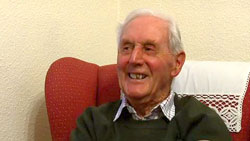 |
| Sergeant Noel Matthews |
The only other thing I would say about that was getting towards the end of the war you got more bomb happy because you had gone through, from my point of view, virtually 4 or 5 years and whereas you would not duck every time you ruddy well went dead because it affected me that way. You knew the war was getting towards the end and that sort of thing. That was one thing that I would recall from that sort of thing. If you dug a slip trench you did not want to get out of it because you felt safer in the ruddy thing than you did getting up onto the ground. It was the only time I ever saw a doodlebug. We were up in Holland and we heard this thing going over and we didn’t know what the hell it was at the time and I was with a Welsh lad and we had dug down about 6 foot. You could virtually see the top of it. I don’t know what we would have done. He was snoring his head off. When it is dead quiet. Little things like that. We went into Hamburg just like that. As you know, the surrender came through the battalion that the first lot that came in, two Germans with a civilian and he stayed behind and asked us not to shell near the hospital because his factory was still there and then they said they wanted the chap in charge of Hamburg to do the surrender. We moved into Hamburg and that was just a ruin. Amazing thing about these places was that the roads were completely clear. All the rubble at the side of the roads and our section was in a big building and there were 4 coffins on trestles and do you know they were all draped with Gestapo flags and nobody pinched those ruddy flags. It was unfortunate. No one pinched them at all. The other thing was at the top of this road was a red light area. All the girls were up there and somebody got a football. Don’t know where from. That was untouched, that little bit of area, until when we left every window in that road was broken. We were there for a couple of days. We did patrols into Hamburg and that sort of thing. Sort of showing that we were around and we moved up towards Denmark then. We were out, the carriers were out as usual. After we left Hamburg it was impossible. We moved into a field, I have a picture and the Germans came down the road en masse literally for 3 days. There was no way you were going to move up the road and although it says in the book we had comfortable billets we slept out in the fields. We left there eventually, can’t think of anything special, because the war had ended there and we were told we were going to Berlin. We went into Berlin on tank transport through the Russian zone and we went into the barracks at Spandau which are now hotel buildings. We went into the barracks and you could see bugs climbing up the wall and all the rest and we thought we are not sleeping here, we are sleeping outside, which we did until they fumigated them. They had displaced people in there. It was not their fault. It was the conditions. We stayed in Berlin for 3 months. There was nothing in Berlin other than old men, women and children. Literally that was Berlin and rubble anywhere you went. I was taken, I have some pictures of Berlin. The Tiergarten, we went back there, and the Tiergarten was completely devoid of trees. You go there now and it has trees but literally they had all been cut down. I have a picture of one of our blokes standing beside an 88 and the Reichstag building. That was all shattered with all the Russian shelling and all that.